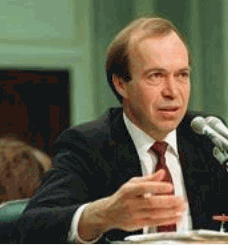|
|
|
|
|
|
|
News & Views item - September 2008 |
![]() NASA's Climate Scientist, James Hansen, Speaks Out Against Coal.
(September 9, 2008)
NASA's Climate Scientist, James Hansen, Speaks Out Against Coal.
(September 9, 2008)
 The
director of NASA's Goddard Institute for Space Studies in New York City, James
Hansen, gained world-wide public attention when early last year he railed
against political interference regarding his scientific reports.
The
director of NASA's Goddard Institute for Space Studies in New York City, James
Hansen, gained world-wide public attention when early last year he railed
against political interference regarding his scientific reports.
Testifying at a congressional hearing, Dr. Hansen said that editing like that done by Mr. Cooney* and efforts to limit scientists’ access to the press and public amounted to censorship and muddied the public debate over a pressing environmental issue: "If public affairs offices are left under the control of political appointees, it seems to me that inherently they become offices of propaganda."
Last week, the climate scientist was in London, to testify on behalf of activists who defaced a coal-fired power station in Kent.
Below are excerpts from NatureNews' Geoff Brumfiel's interview with Dr Hansen.
GB: Why did you come to testify?
JH: . If you look at the size of the oil, gas and coal reservoirs you'll see that the oil and gas have enough CO2 to bring us up to a dangerous level of greenhouse gases in the atmosphere. There's a potential to solve that problem if we phase out coal. If we were to have a moratorium on coal-fired power plants within the next few years, and then phase out the existing ones between 2010 and 2030, then CO2 would peak at something between 400 and 425 parts per million. That leaves a difficult problem, but one that you can solve.
GB: We need to get energy from somewhere. So if we're not getting it from coal, then where?
JH: The first thing we should do is focus on energy efficiency. The fact that utilities make more money by selling more energy is a big problem. We have to change those rules. Then there is renewable energy — in order to be able to fully exploit renewable energy, we need better electric grids. So those should be the first things, but I think that we also need to look at next-generation nuclear power.
GB: What do you think the roll of the scientist should be in the broader societal debate on climate change?
JH: I think it would be irresponsible not to speak out. There is a clear gap between what is understood by the relevant scientific community and what is known by the public, and we have to try and close that gap. If we don't do something in the very near future, we're going to create a situation for our children and grandchildren that is out of control.
_______________________________
*Philip A. Cooney, who left US government employment in 2005, defended the changes he made in government reports over several years, saying his editing was part of the normal White House review process and reflected findings in a climate report written for President Bush by the National Academy of Sciences in 2001.